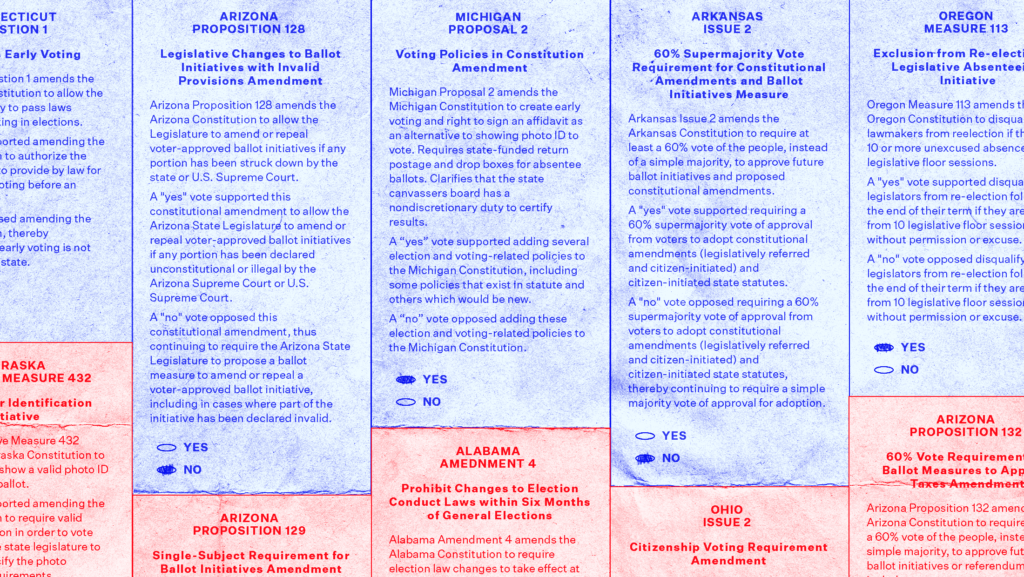Voting Won at the Polls This Year

Stymied by a Republican legislature, Michiganders turned to the ballot measure process to enact a package of reforms to make voting easier in the state. Despite a last-ditch effort by Republican members of the state canvassing board to block its placement on the ballot, Proposal 2 made it to the polls and passed with a resounding majority. When voters are given the opportunity to decide on pro-voting policies, these measures win more often than not.
During this year’s midterm elections, voters used their voice to directly impact policy through ballot measures, deciding on policy areas from reproductive rights to taxation to gun control. Like Michiganders, voters in 10 other states weighed in on democracy-related ballot measures. Now that the dust has settled and (most) of the results are in, here’s what happened to those measures.
Voting and democracy scored wins in several states.
In several states, voters rejected proposed changes that would have made the ballot initiative process more difficult. Arizonans rejected Proposition 128, which would have given the state legislature more power to amend or repeal measures approved by the voters. Over in Arkansas, voters defeated Issue 2, which would have required all constitutional amendments and citizen-led ballot measures to earn at least 60% of the vote. Both of these states joined voters in South Dakota, who voted down the state’s own proposed supermajority requirement for ballot measures during the primary election in June. Arizonans also rejected a proposal that would have strengthened voter ID requirements.
Connecticut and Michigan adopted proposals that will make voting easier in both states. Connecticut approved an amendment to the state constitution that will allow the state to enact in-person early voting. Now, the Connecticut Legislature will be able to pass laws giving voters the option to vote early in-person — Connecticut is one of only four states without this option. Michiganders voted in favor of Proposal 2, a package of pro-voting reforms like in-person early voting, rules for drop boxes, and a permanent mail-in voting list. Proposal 2 will also add a “fundamental right to vote” to the Michigan Constitution.
Other states approved changes to their democratic processes. Nevadans voted in favor of an open top-five primary and ranked-choice general election. Under Question 3, the state would hold a single primary open to all voters in which the top five candidates would advance to the general election. Then, during the general election, voters would rank the five candidates in order of preference. Now, under the Nevada Constitution, voters must approve the measure again in 2024 for the new system to be enacted. In the Pacific Northwest, Oregon voters approved Measure 113, which will punish legislators who use walkouts to block the legislative process — a tactic the Republican minority has used to thwart Democratic proposals. Finally, Florida voters rejected a proposed amendment that would have abolished the Florida Constitution Revision Commission, a body that helps give Floridians the opportunity to amend the state constitution every 20 years.
But there were some setbacks too.
While Arizona voters rejected one proposal that would have made passing future ballot measures more difficult, they did approve two other measures that will add more barriers to this citizen-led process. One requires future measures to embrace a single subject, which may make it more difficult for voters to approve packages of related reforms at once. Arizonans also voted in favor of Proposition 132, which requires any measure that levies a tax or a fee to receive 60% of the vote.
Other states chose to make voting more difficult. Nebraskans voted in favor of Initiative 432, which will require all voters to present a photo ID to vote. The Nebraska Legislature will determine which forms of ID qualify — and the Republican-controlled legislative body could choose to designate a highly restrictive list of IDs. Alabama voters approved an amendment that will prohibit changes to election laws within six months of an election — preventing emergency changes to rules that help voters vote in case of a crisis, like a pandemic.
Finally, Ohio will amend its state constitution to prohibit local governments from extending the right to vote to immigrants. The amendment would not actually change anything about who is currently allowed to vote in Ohio and instead will only fuel false narratives that our elections are insecure and that noncitizens vote. Louisiana voters will cast their ballots on a similar amendment to the Louisiana Constitution during the state’s runoff election on Dec. 10.
Despite some setbacks, voting and democracy achieved important victories through the ballot measure process. Thanks to the voters, voting will become easier in Connecticut and Michigan and states like Nevada and Oregon will continue their roles as laboratories for democracy by experimenting with new election rules and holding legislators accountable. The outcomes of the midterm elections underscore just how vital the ballot measure process is for American democracy.